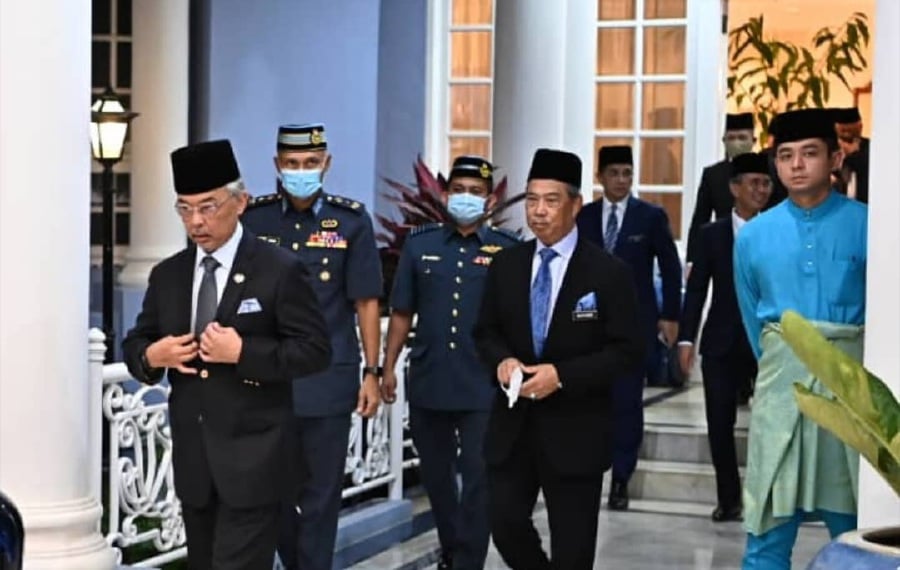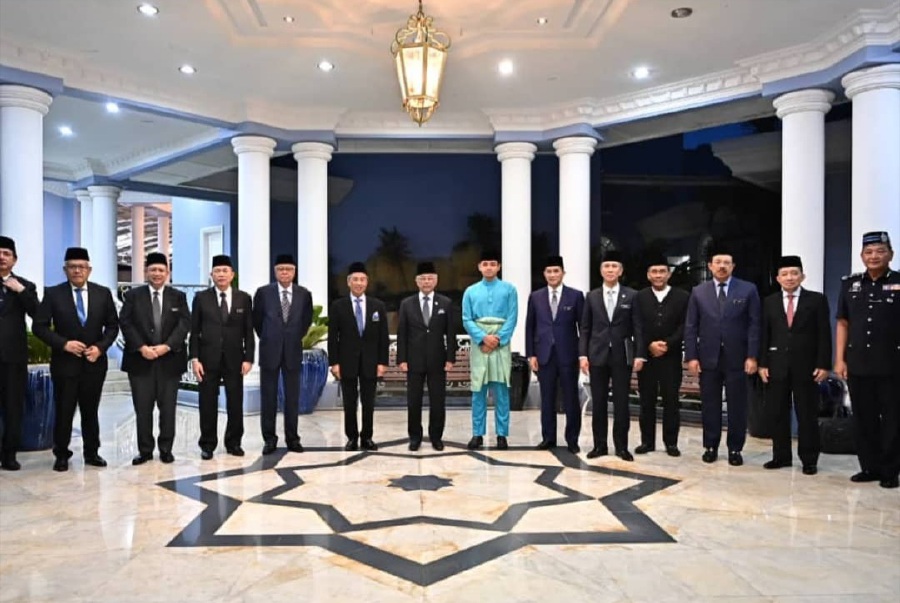Rising Covid-19 cases - it is foolish even to consider EMERGENCY - we already have the Prevention And Control Of Infectious Diseases Act 1988(PACID Act), and we have all seen the powers of that Act, when the Movement Control Order came into being - it literally was able to even shut down Parliament, the Courts, and all business to CURB the spread of Covid-19 >> there is no need for any Proclamation of Emergency.
Then, mind you, we still have that draconian National Security Council Act 2016(NSC Act), whereby there the King is not involved. Power rests with the Prime Minister and the National Security Council
The NSC Act confers and concentrates vast executive powers in the National Security Council (“NSC”), which is chaired by the Prime Minister and functions at his dictates. The Cabinet is subordinated to the NSC, which is able to exert control over regulatory authorities such as Bank Negara Malaysia, Securities Commission, and the Malaysian Anti-Corruption Commission. Even the authority of State Governments can be overridden.The NSC’s scope of authority over matters of “national security” is expansive. As the term “national security” is not explicitly defined in the NSC Act, the NSC would be able to treat almost any matter as one of national security.Further, the NSC (and in effect the Prime Minister) has extremely wide discretion to declare an area as a security area. The Prime Minister may also extend the period of such declaration for an unlimited number of times, and therefore for an indeterminate duration that could extend for years.The NSC Act enables the Prime Minister, either unilaterally or through the NSC, to exercise authoritarian executive powers. These powers are in effect emergency powers, but without the need for a proclamation of an emergency under Article 150 of the Federal Constitution. This usurps the powers vested in the Yang di-Pertuan Agong in, and violates the provisions of, Article 150 of the Federal Constitution. The Act is therefore of questionable constitutional validity. -National Security Council Act 2015 has All the Hallmarks of Authoritarianism - Malaysian Bar
So, why are we talking about Emergency Proclamation by the King - we should also be concerned with the National Security Council Act, which sadly that 'alternative' Pakatan Harapan government failed to repeal fast...
So, what is our Prime Minister's fear - is it Covid-19? Or is it losing of his premiership as he may have lost the confidence of the majority - Anwar Ibrahim recently publicly declared that he had a significant majority - and he met the King, but then failed to disclose any list of MPs to prove his claim to be true - The palace came out disclosing this fact.
Muhyiddin has a razor thin majority - with about 113 MPs supporting him, which means that if two or more have lost their confidence in hi, he has little choice to RESIGN or ask the King to dissolve parliament which will lead to a new General Elections. The King can refuse to disolve Parliament, and simply appoint another MP who has the majority confidence of the MPs to be Malaysia's next Prime Minister. Anyonje who can show that he has the confidence of 112 or more MPs will be our new Prime Minister.
In a democracy, that is how it should be - the Declaration of Emergency, or using the National Security Council Act to simply stay in power is just so undemocratic.
But, the problem maybe that NO ONE may now have the majority required to be the next Prime Minister --- not a problem, for until one is decided, the King can always appoint Muhyiddin or some other to be the interim Prime Minister.
Party Hopping and 'backtracking on positions taken' seem to be a plague affecting many of our current MPs. Today they may support someone, even to the extend of giving a Signed Statutory Declaration ...and within hours they may change their position...
An Emergency now may make Malaysia a joke to the international community - and, if is an Emergency proclaimed by the King pursuant to article 150 of the Federal Constitution, the blame may fall on the King primarily - not PM Muhyiddin.
Why not the National Security Council Act - well, the problem may be composition - maybe not all supports Muhyiddin, and as such maybe a cabinet re-shuffle may be needed before that...After all the Act specifies, who will be in the National Security Council
The Council shall consist of the following members:
(a) the Prime Minister as Chairman;
(b) the Deputy Prime Minister as Deputy Chairman;
(c) the Minister charged with the responsibility for defence;
(d) the Minister charged with the responsibility for home affairs;
(e) the Minister charged with the responsibility for communication and multimedia;
(f) the Chief Secretary to the Government;
(g) the Chief of Defence Forces; and
(h) the Inspector General of Police.
If the National Security Council Act is used, then the blame falls on the Prime Minister...not the King.
But as I said, there is no need to resort to Emergency Proclamations or even the National Security Council Act - the Prevention And Control Of Infectious Diseases Act 1988(PACID Act) is sufficient to deal with the Covid-19 Pandemic, and it also can suspend Parliament indefinitely...
Is the upcoming Budget and Financial Bills, which needs to be passed, the problem - I am sure that our 'learned' MPs would be able to agree to a reasonable Budget, despite whether they are government and/or in the Opposition > so, no big deal.
It is premature to declare Emergency now - maybe, if there is a problem getting the Budget approved later in time, then maybe we may then consider a solution then and only then....
There are no justification for any Emergency to be declared...there is uncertainty as to the proposal of the Prime Minister, let alone what the Conference of Rulers will be discussing - but hopefully, it will not undermine DEMOCRACY.
State of Emergency: YDP Agong to consult Malay Rulers

KUALA LUMPUR: Yang di-Pertuan Agong Al-Sultan Abdullah Ri'ayatuddin Al-Mustafa Billah Shah will be consulting the Malay Rulers on the proposal raised by Prime Minister Tan Sri Muhyiddin Yassin yesterday.
Comptroller of the Royal Household for Istana Negara Datuk Ahmad Fadil Shamsuddin said the King understands the need for continuity in the country's administration in the fight against the third wave of the Covid-19 pandemic that hit many parts of the country.
Ahmad Fadil said the Yang di-Pertuan Agong is also concern about the anxiety and exasperation among the people following the latest developments.
"Following the session yesterday, Al-Sultan Abdullah has agreed to consult fellow Malay Rulers at Istana Negara soon to discuss and deliberate the proposal raised by Tan Sri Muhyiddin Yassin," said Ahmad Fadil in a statement this morning.
The King, he said, also called on the people to remain calm, not panic and stay patient in facing the latest developments pending a decision on the proposals by the prime minister.
It is learnt that during his meeting with the Yang di-Pertuan Agong at Istana AbdulAziz in Indera Mahkota, Kuantan yesterday, Muhyiddin had proposed for a declaration of emergency which entails the prorogation of Parliament.
The Third Term of the 14th Dewan Rakyat session is supposed to convene for 27 days from Nov 2 until Dec 15.
The Yang di-Pertuan Agong may declare a state of emergency under Article 150(1) of the Federal Constitution if a major emergency to the security or economic life or public order in the federation or any part thereof (has) existed.
Under Article 150(2), the King may also make an emergency proclamation if he is satisfied that the threat of a major emergency to national security, or the economic life or public order is almost true.
Three grounds can be used by the Yang di-Pertuan Agong to make a declaration of emergency, that is if it is a threat to national security; economic life; or public order.
Article 55 of the Federal Constitution stipulates that only His Majesty The King can summon for Parliament to be in session. His Majesty also has the absolute power to prorogue or dissolve the Parliament.
Legal expert Datuk Dr Gurdial Singh Nijar said a state of emergency proclamation will empower the Yang di-Pertuan Agong to enact laws (called ordinances), widen the Parliament and executive powers as well as override state power.
He said an "emergency" happens when there is a perceived threat to the security, economic life or public order of the country or any part where there is no need for an actual breach of the peace or violence.
"Any imminent threat suffices. As the Privy Council ruled in a celebrated decision: 'a state of emergency is something that does not permit of any exact definition: it connotes a state of matters calling for drastic action….'"
Gurdial said four emergencies had been declared so far: in 1964 (to deal with the Indonesian confrontation); 1966 (to get rid of the Sarawak Chief Minister at the behest of the Federal Government); 1969 (in the aftermath of the May 13 racial riots) and 1977 (as a result of the collapse of the Kelantan government then headed by Datuk Mohamed Nasir).

A source said based on the the Yang di-Pertuan Agong's recent statement urging politicians not to plunge the country into another round of political uncertainty coupled with the disappointment expressed by Sultan of Selangor Sultan Sharafuddin Idris Shah over the endless political turmoil that had caused uneasiness among the people, it can be inferred that the Rulers are supportive of ensuring political stability in order to win war against third wave Covid-19, which have unleashed its fury on several parts of the country.
The surge of Covid-19 infections with active cases reaching 8,146 patients and the daily death toll hitting all time high of 10 as of noon yesterday, has triggered concern among health authorities.
It is learnt that a decision is expected to be made earliest today or in the next few days. - New Straits Times, 24/10/2020





No comments:
Post a Comment